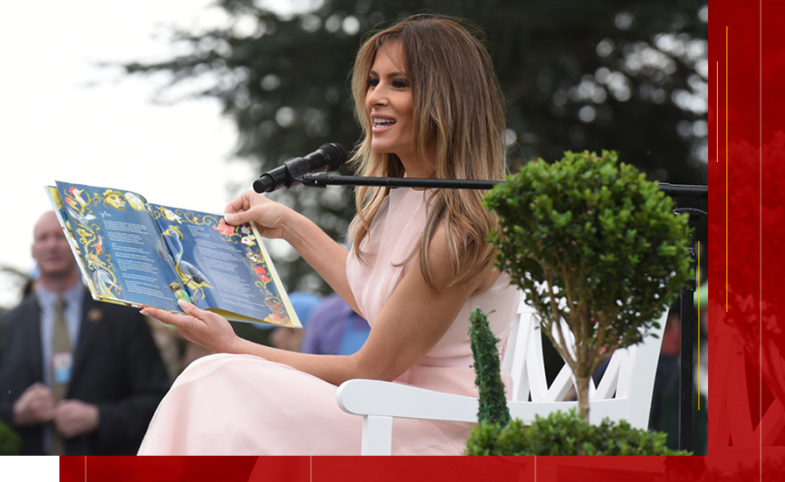The CPD Blog is intended to stimulate dialog among scholars and practitioners from around the world in the public diplomacy sphere. The opinions represented here are the authors' own and do not necessarily reflect CPD's views. For blogger guidelines, click here.

Public Diplomacy in the News: AI Politics, Melania Trump's Soft Power, & Durian Diplomacy
“Public Diplomacy in the News” is a CPD Blog series by Andrew Dubbins that spotlights noteworthy stories on public diplomacy topics such as cultural diplomacy, nation branding, exchange programs, international events and conferences, digital diplomacy, and strategic global communications.
Melania Trump’s quiet influence and Europe’s waning unity. Slovenian President Nataša Pirc Musar views her former client Melania Trump as a moderating force on her husband, using “soft power” to temper his decisions and open diplomatic channels, including outreach to Vladimir Putin over Ukrainian children. Speaking from Ljubljana, Pirc Musar praises Melania’s empathy while warning that both the U.S. and Europe risk losing global credibility by neglecting international law and human rights. She questions recent U.S. military actions, and laments Europe’s disunity as member states diverge over defense and relations with Russia. Despite NATO pressure to boost military spending, the Slovenian leader—self-described as a pacifist—urges diplomacy over force, warning that once credibility is lost on the world stage, “it takes years to get it back.”
AI politics and the Trump playbook. Donald Trump is redefining political communication through the aggressive use of AI-generated videos that blend satire, spectacle, and misinformation. His recent posts, portraying himself as a crowned fighter pilot and even as the pope, demonstrate a deliberate evolution of his digital strategy, fusing meme culture with AI-enhanced propaganda to energize supporters and provoke opponents. Experts warn that the realism and virality of such content amplify misinformation and blur the boundaries between humor, manipulation, and political messaging. While Trump’s campaign sees AI as a way to reach younger audiences and control the narrative, analysts caution that this approach marks a troubling shift in public discourse—one that normalizes deepfakes, fuels polarization, and challenges efforts to regulate truth in the digital age
Rebecca Schneid and Andrew R. Chow / Time
The vanishing discipline of foreign policy. Frank Lavin, a USC fellow and former U.S. Ambassador to Singapore, argues that U.S. foreign policy has eroded into a state of reactive isolationism, leaving the international system adrift. Using a metaphor of 193 diners in a restaurant, he suggests nations now act independently with little regard for collective order or rules-based cooperation. Over the past seventeen years, successive U.S. administrations—from Obama’s hesitant engagement to Biden’s partial retrenchment and Trump’s current indifference—have contributed to a collapse of consistent global leadership. Meanwhile, China has seized the initiative, asserting its influence through calculated expansionism in the South China Sea and beyond. Lavin warns that if the U.S. continues to treat global crises as someone else’s problem, it risks ceding the structure of world order to those who still believe foreign policy exists.
‘Durian diplomacy’ takes root in Asia. Once derided for its pungent odor, the durian has become an unlikely symbol of soft power across Southeast Asia as China turns its growing appetite for the “king of fruits” into a tool of regional diplomacy. China’s demand—now exceeding 1.5 million tons annually—has spurred multibillion-dollar import deals with Thailand, Vietnam, Malaysia, the Philippines, and Cambodia, positioning the fruit as both a cultural bridge and a strategic bargaining chip. By leveraging “durian diplomacy,” Beijing strengthens ties with ASEAN nations and counters U.S. influence, transforming trade in this spiky delicacy into an instrument of geopolitical charm. Experts see the trend as part of a long tradition of culinary diplomacy, where food, once exchanged around campfires, now shapes modern statecraft.
Gloria Dickie / Foreign Policy
When football becomes foreign policy. John Kenneth White, professor emeritus at The Catholic University of America, argues that sports and culture now serve as vital tools of diplomacy amid global uncertainty. The recent NFL showdown between the Pittsburgh Steelers and Minnesota Vikings in Dublin, which drew nearly 8 million viewers and generated $200 million for Ireland, exemplified how athletic and cultural events can strengthen U.S.-Irish ties. Irish Ambassador Geraldine Byrne Nason called sports diplomacy a “desperately needed space” for fostering collaboration, noting bipartisan congressional engagement and musical performances that deepened goodwill. As U.S.-EU trade tensions rise under renewed tariffs and Irish skepticism toward Trump grows, White suggests that cultural exchanges—from football to music—provide a softer, more unifying form of diplomacy that bridges divides when politics cannot.
Visit CPD's Online Library
Explore CPD's vast online database featuring the latest books, articles, speeches and information on international organizations dedicated to public diplomacy.
POPULAR ARTICLES
-
January 29
-
January 20
-
January 28
-
February 6
-
January 8
Join the Conversation
Interested in contributing to the CPD Blog? We welcome your posts. Read our guidelines and find out how you can submit blogs and photo essays >.









